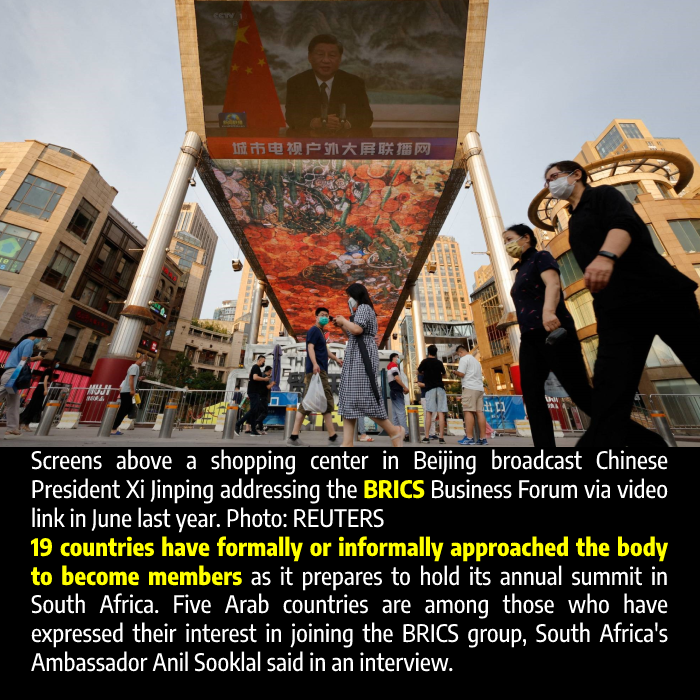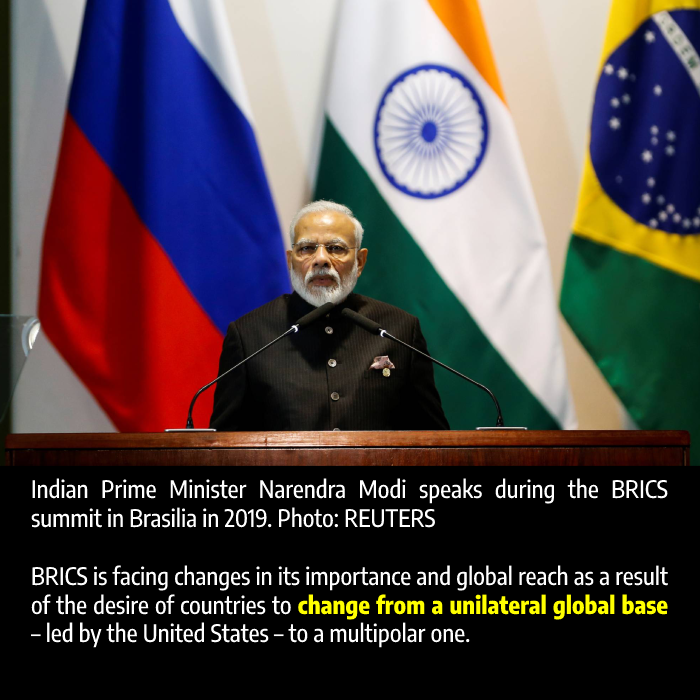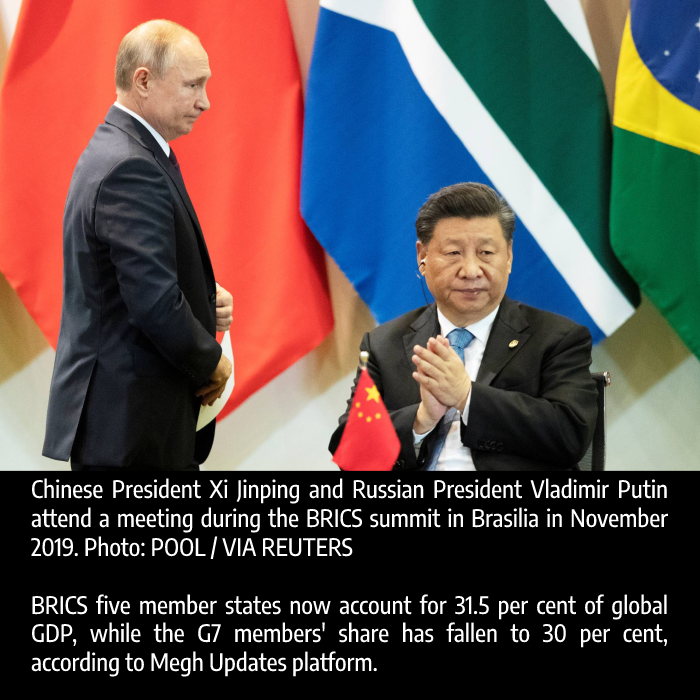By Gabriel Dominguez. 26 May 2023

The foreign ministers of the BRICS group of major emerging economies will meet in South Africa on June 1-2 to discuss pressing geopolitical issues, including the bloc’s first enlargement in over a decade as it seeks to position itself as a representative of the “Global South” and provide an alternative model to the Group of Seven.
At their summit in Cape Town, the top diplomats of Brazil, Russia, India, China and South Africa will discuss both the formal and informal membership applications of at least 20 countries and the modalities for future enlargement, Anil Sooklal, South Africa’s ambassador to BRICS, said in an exclusive interview.
First proposed by China when it chaired the group last year, the planned expansion would increase representation from countries in Africa, Latin America, the Middle East and Asia, with the list of interested nations including Egypt, Nigeria, Mexico, Iran, Indonesia, Turkey and others.
“This is positive news for the bloc, as it demonstrates the confidence of the Global South in the leadership of our group,” Sooklal said, adding that efforts to boost trade in local currencies will also be part of the talks.
The term Global South refers to a loose grouping of roughly 100 nations, many of which are developing and not aligned with any major power.
Most of them, however, are still largely marginalized in terms of global decision-making, Sooklal said, which is why the BRICS is trying to create a “more inclusive” international order that “addresses the existing fault lines on the global, geopolitical, geoeconomic and financial architecture.”
“What you’re seeing here is that these countries want to have a greater say in the evolving global architecture,” the ambassador said. “They would like to see a multipolar, multicultural and multicivilizational world that is not dominated by one or two hegemons, and where they have more independence and choices to determine what’s in their best interest.”
Indeed, Russia’s invasion of Ukraine has made the BRICS more relevant, especially for countries in the Global South that want to resist the West’s “autocracy-vs-democracy” narrative, said Ryan Berg, director of the Americas Program at the Washington-based Center for Strategic and International Studies (CSIS).
For many of them, multilateral organizations that bring together countries of the Global South can offset the pressure to align with the United States or China on specific issues and preserve a small sphere of policy autonomy, he added.
It’s important to note that most countries seeking to join the transregional BRICS are not G7 rivals and do not necessarily oppose the liberal international order but rather want to hedge their risks in an increasingly unpredictable geopolitical and geoeconomic landscape.

The growing engagement with various multilateral frameworks illustrates that power and national interest are rapidly diversifying in today’s world, said Sebastian Maslow, a lecturer at Sendai Shirayuri Women’s College.
If expanded, the BRICS grouping is expected to provide other emerging economies with a platform to advocate their interests and coordinate action, he said, noting that G7 members have recognized this competition over the Global South as shown in the participation of countries like India and Brazil at summits last year and recently in Hiroshima.
That said, it is unlikely that the addition of new members alone will enable BRICS to effectively counterbalance the U.S.-led international order or even challenge established international norms and principles, Maslow said. For this to happen, the grouping must first offer an alternative that would credibly undermine the benefits of the current order, he added.
But that is precisely what the group wants to achieve, particularly in terms of economic development, which is often the top priority among Global South countries.
BRICS countries have traditionally focused more on development issues than the G7. Experts say they also tend to be more flexible on governance mechanisms, which could spell different norms, rules, and practices when it comes to economics and finance.
Joe Sullivan, a former White House official now at The Lindsey Group, an economic advisory firm, said the main reason behind this focus is that Global South countries perceive the International Monetary Fund and World Bank as failing to give them a voice.
“For decades, these countries lacked a credible alternative to these Western economic institutions, but this has changed with the BRICS initiative,” Sullivan said, pointing out that the planned expansion would give BRICS more leverage and credibility as an alternative to Western-led institutions.
“And with that credibility comes bargaining power,” he added.
Some experts say these countries may be able to access financing with fewer restrictions through BRICS mechanisms, including the New Development Bank (NDB), than through the IMF or World Bank.
The BRICS group aims to provide these nations with a way to work more closely together on common economic and development issues, and less on political and security issues, said Stefanie Kam, a research fellow at the Singapore-based S. Rajaratnam School of International Studies.
This comes as Chinese capital, in particular, has emerged as a rising force shaping development in many of these countries, including in the extractive, infrastructure and trade sectors, Kam added.
Emerging economies are looking for alternative sources of capital amid concerns about the sustainability and reliability of the West’s pivot to Asia, which some view as largely motivated by concerns over Beijing’s growing international influence.
The BRICS members now make up the world’s largest economic bloc by purchasing power parity (PPP), with the group recently overtaking the G7 with a 31.5% share of world GDP (PPP) compared to 30.7% for the latter, according to data published earlier this year by the U.K.-based economic research firm Acorn Macro Consulting.
And that gap, along with the economic influence of the BRICS, is expected to grow this year, especially if more countries join the latter. But to truly present themselves as an alternative economic development model, the group understands it must also reduce dependence on the world’s top reserve currency: the U.S$..
As Berg explains, BRICS members are pushing for a non-dollar-denominated world because they believe that a world with multiple reserve currencies would give them more policy autonomy. New Delhi, for instance, already has agreements with at least 18 countries, including Russia, for settling payments in Indian rupees.

Countries such as Brazil and Argentina have signed currency swap deals with Beijing to allow them to conduct trade in Chinese yuan to reduce the cost of bilateral trade and limit their exposure to fluctuations in the value of the U.S. dollar.
Moreover, the NDB’s chief, ex-Brazilian President Dilma Rousseff, revealed in April that the bank is gradually moving away from the dollar, promising at least 30% of loans in the local currencies of member states.
“It’s about financial independence and sovereignty,” Sooklal said. “These countries want greater determination in terms of investments, trade and financing sources. They don’t have to be straitjacketed into a certain currency or financial institution,” he added.
But perhaps more importantly, BRICS members understand that the current dollar-based payment system leaves them vulnerable to U.S. sanctions. A good example of this is how Moscow and Beijing dramatically increased trading in local currencies not long after Russia was slapped with Western sanctions following its invasion of Ukraine.
Reducing dependence is also crucial for China, which finds itself in an intensifying geopolitical competition with Washington, as it would not only help internationalize the yuan but also limit the impact of U.S. sanctions on the world’s second largest economy.
“Using another currency for transactions could work, and having more countries use that currency can help with its acceptance,” said Ian Chong, a professor of political science at the National University of Singapore. That said, the stability of the currency over time is important in enabling it to work, he added.
Since its formation in 2006, the BRICS grouping has expanded only once, with the inclusion of South Africa in 2011.
The current members themselves seem to have different reasons for wanting to bring in new members. For instance, besides promoting the yuan, China could use an expanded BRICS forum to promote new global norms that underpin its own vision for a global order, including its Belt and Road initiative, Maslow said.
Russia could promote the group as a platform to show its own citizens and the world that Moscow is not isolated, despite Western sanctions, while India could use it to enhance its role as leader of the Global South and keep China in check through multilateral engagement, the expert added.
However, there are also big challenges ahead. While the planned enlargement would demonstrate BRICS’ appeal, the move also risks diluting the benefits of membership.
The bloc’s growing diversity in political and economic systems could also mean that consensus on key issues may be much more difficult to reach than in the exclusively democratic G7.
Both of these issues are likely to be discussed when the group’s leaders meet in August for their annual summit.
Source: The Japan Times. 26 May 2023